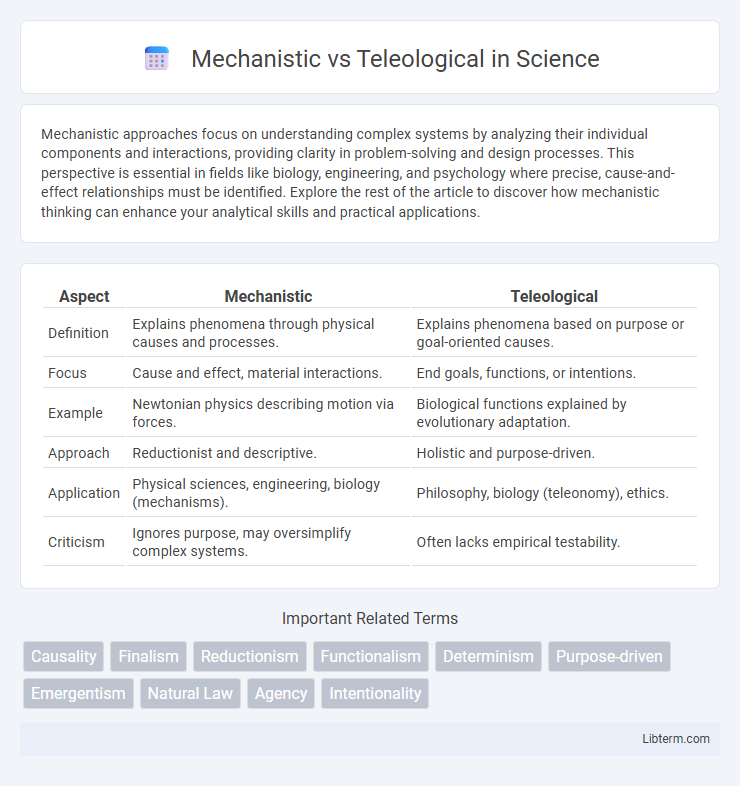Mechanistic approaches focus on understanding complex systems by analyzing their individual components and interactions, providing clarity in problem-solving and design processes. This perspective is essential in fields like biology, engineering, and psychology where precise, cause-and-effect relationships must be identified. Explore the rest of the article to discover how mechanistic thinking can enhance your analytical skills and practical applications.
Table of Comparison
| Aspect | Mechanistic | Teleological |
|---|---|---|
| Definition | Explains phenomena through physical causes and processes. | Explains phenomena based on purpose or goal-oriented causes. |
| Focus | Cause and effect, material interactions. | End goals, functions, or intentions. |
| Example | Newtonian physics describing motion via forces. | Biological functions explained by evolutionary adaptation. |
| Approach | Reductionist and descriptive. | Holistic and purpose-driven. |
| Application | Physical sciences, engineering, biology (mechanisms). | Philosophy, biology (teleonomy), ethics. |
| Criticism | Ignores purpose, may oversimplify complex systems. | Often lacks empirical testability. |
Defining Mechanistic and Teleological Approaches
Mechanistic approaches analyze systems by breaking them down into their individual components and understanding their functions through cause-and-effect relationships. Teleological approaches explain phenomena based on their purposes or goals, emphasizing the intended outcomes or design behind processes. Both frameworks offer distinct perspectives: mechanistic focuses on structural and functional details, while teleological highlights the rationale and objectives driving systems.
Historical Background and Philosophical Roots
Mechanistic philosophy traces its origins to the Scientific Revolution of the 17th century, heavily influenced by figures like Descartes and Newton, who emphasized a universe governed by physical laws and causal mechanisms. Teleological thought dates back to ancient Greek philosophers such as Aristotle, who posited that natural phenomena are directed toward specific purposes or ends (final causes). The historical tension between these perspectives shaped Western philosophy by contrasting empirical, law-driven explanations with purpose-driven interpretations of nature.
Core Principles of Mechanism
Mechanism centers on the principle that natural phenomena operate through cause-and-effect relationships governed by physical laws, emphasizing objective observation and empirical evidence. It asserts that complex systems can be understood by analyzing their parts and interactions without invoking purpose or inherent goals. This approach contrasts with teleological explanations by rejecting final causes and highlighting deterministic processes as the foundation of scientific inquiry.
Key Concepts in Teleological Thinking
Teleological thinking centers on purpose-driven explanations, interpreting phenomena based on intended outcomes or goals rather than mechanical causes. It emphasizes final causes, where entities or events are understood by the function they serve or the purposes they fulfill within a broader system. This approach is fundamental in fields such as biology, ethics, and design, where the existence and behavior of objects or beings are explained through their end goals and inherent purposes.
Mechanistic Explanations in Science
Mechanistic explanations in science focus on detailing the underlying processes and components that produce observable phenomena, emphasizing cause-and-effect relationships and physical interactions. These explanations rely on empirical evidence to uncover the structure, function, and dynamics of systems, such as biochemical pathways or neural circuits. Mechanistic approaches enhance predictive power by breaking down complex behaviors into discrete, testable mechanisms grounded in natural laws.
Teleological Perspectives in Nature
Teleological perspectives in nature emphasize purpose-driven processes, interpreting biological features as inherently goal-oriented and functionally designed. This viewpoint highlights the role of adaptive functions in the evolution of species, where traits exist because they serve specific purposes contributing to survival and reproduction. By focusing on end goals and final causes, teleological approaches provide insights into natural phenomena as directed and meaningful, contrasting mechanistic explanations that stress causality and physical laws.
Comparing Causation: How and Why
Mechanistic causation explains events through specific, identifiable processes and physical interactions, focusing on how things happen step-by-step in a deterministic chain. Teleological causation emphasizes purpose and end goals, interpreting events based on why they occur to fulfill particular functions or objectives. Comparing both reveals that mechanistic views prioritize efficient causes while teleological perspectives highlight final causes in explaining phenomena.
Applications in Modern Research
Mechanistic approaches in modern research emphasize causal relationships and deterministic processes, frequently applied in fields like molecular biology and engineering to unravel structural and functional dynamics. Teleological frameworks prioritize purpose-driven explanations, heavily utilized in behavioral sciences and artificial intelligence to interpret goal-directed systems and adaptive behaviors. Integration of mechanistic and teleological perspectives enhances interdisciplinary studies, improving predictive models and facilitating innovations in robotics, cognitive science, and evolutionary biology.
Debates and Controversies
Debates surrounding mechanistic versus teleological explanations often focus on the merits of determinism versus purpose-driven reasoning in scientific and philosophical contexts. Critics of mechanistic views argue that they overlook intentionality and intrinsic purposes found in biological and social systems, while proponents assert that mechanistic models provide more testable and empirical frameworks. Conversely, teleological approaches face scrutiny for potentially introducing circular reasoning and lacking predictive power, fueling ongoing controversies about their validity in explaining natural phenomena.
Implications for Future Inquiry
Mechanistic approaches, emphasizing causality and empirical evidence, drive future inquiry toward precise modeling and predictive analytics in scientific research. Teleological perspectives prioritize purpose and goal-oriented explanations, encouraging exploration of complex systems and adaptive behaviors in fields like biology and artificial intelligence. Integrating both frameworks may enhance interdisciplinary methodologies, fostering comprehensive understanding and innovative problem-solving strategies in emerging scientific domains.
Mechanistic Infographic

 libterm.com
libterm.com